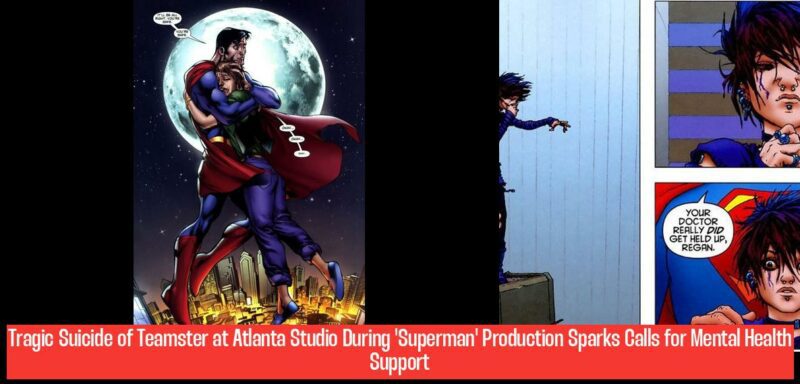A Tragic Loss: Teamster’s Suicide at Trilith Studios During ‘Superman’ Production
The entertainment industry is often portrayed as glamorous and exciting, but behind the scenes, it can be a demanding and stressful environment. This harsh reality was tragically underscored on Wednesday morning when a Teamster working on DC Studios’ “Superman” film died by suicide at Trilith Studios in Atlanta, Georgia. The news of this loss has sent shockwaves through the industry, prompting conversations about mental health and the pressures faced by film crews.
The incident, confirmed by local authorities to IndieWire and corroborated by insider sources, highlights the invisible toll that long hours, tight deadlines, and demanding production schedules can take on individuals working in film. This tragedy serves as a stark reminder that the pursuit of cinematic magic often comes at a significant human cost. The Teamster, identified by Deadline as a female crew member, was reportedly involved in the James Gunn-directed “Superman” film. While the specifics of her role remain undisclosed, her passing is a poignant reminder that even those working behind the scenes on a large-scale production like “Superman” are deeply impacted by the demands of the industry.
The Importance of Mental Health Support in the Film Industry
This heart-wrenching incident underscores the critical need for greater awareness and support for mental health in the film industry. Despite the outward appearances of glamour and excitement, the reality is that film crews often work long and grueling hours under immense pressure to meet deadlines and deliver high-quality results. This demanding environment can take a toll on individuals’ mental well-being, leading to burnout, anxiety, and even depression.
The film industry has historically been slow to address the issue of mental health, often prioritizing production deadlines and profitability over the well-being of its workers. However, recent years have seen a growing movement to prioritize mental health, with studios and production companies taking steps to create a more supportive work environment. These efforts include providing access to mental health resources, promoting open communication about mental health challenges, and creating a culture of empathy and understanding.
The Impact of the Suicide on the “Superman” Production
The suicide of the Teamster working on “Superman” has understandably cast a shadow over the production, prompting a pause in filming and a period of reflection. The studio and production team have expressed their deep sorrow and condolences to the individual’s family and friends.
This tragic incident highlights the importance of prioritizing mental health and well-being on film sets. With long hours, demanding schedules, and often-intense creative pressures, it is essential to create a work environment where individuals feel supported and empowered to seek help when needed.
A Call for Greater Awareness and Support
The suicide of the Teamster at Trilith Studios serves as a stark reminder of the importance of prioritizing mental health in all industries, but especially in those that are demanding and high-pressure, like the film industry. This tragedy underscores the need for:
- Increased awareness: There needs to be a greater understanding of the mental health challenges faced by those working in the film industry. This includes recognizing the signs and symptoms of burnout, anxiety, and depression, and knowing where to seek help.
- Accessible resources: Studios and production companies need to provide readily accessible mental health resources to their employees. This could include on-set counselors, confidential hotlines, and access to mental health professionals.
- Open communication: Creating a culture of open communication about mental health is essential. This means encouraging employees to speak openly about their struggles and providing a safe space for them to do so.
- Flexible work arrangements: The film industry often operates on long and unpredictable schedules. Providing some flexibility in work arrangements, where possible, can help to reduce stress and improve work-life balance.
Remembering the Individual
While the specifics of the Teamster’s role on the “Superman” production remain undisclosed, her loss is a reminder that every individual working in the film industry deserves to be treated with respect, care, and compassion. Her passing is a tragic loss, highlighting the importance of prioritizing mental health and well-being in the industry and beyond.
Moving Forward: Building a More Supportive Industry
The film industry is built on the dedication and hard work of countless individuals, from actors and directors to technicians, crew members, and everyone behind the scenes. It is imperative that we recognize the human cost associated with this demanding profession and take concrete steps to create a more supportive and compassionate work environment. This requires a collective effort from studios, production companies, unions, and individuals within the industry to prioritize mental health, foster open communication, and create a culture of empathy and support. Only then can we truly honor the memory of those who have been lost and ensure that future generations of film professionals have the resources and support they need to thrive.
Read Also : Is DC’s Absolute Batman an Impressive Physical Specimen in This Reinvented Dark Knight Series?
What tragic event occurred at Trilith Studios in Atlanta related to the production of “Superman”?
A Teamster working on the “Superman” film died by suicide at Trilith Studios in Atlanta, Georgia.
Why has the incident at Trilith Studios sparked conversations about mental health in the film industry?
The incident highlighted the toll that long hours, tight deadlines, and demanding production schedules can take on individuals working in film.
What is the importance of mental health support in the film industry, as emphasized by this tragic event?
The incident underscores the critical need for greater awareness and support for mental health in the film industry, given the demanding and stressful nature of film production.
How has the film industry been responding to the issue of mental health in recent years?
Efforts include providing access to mental health resources, promoting open communication about mental health challenges, and creating a culture of empathy and understanding to support the well-being of film crews.



